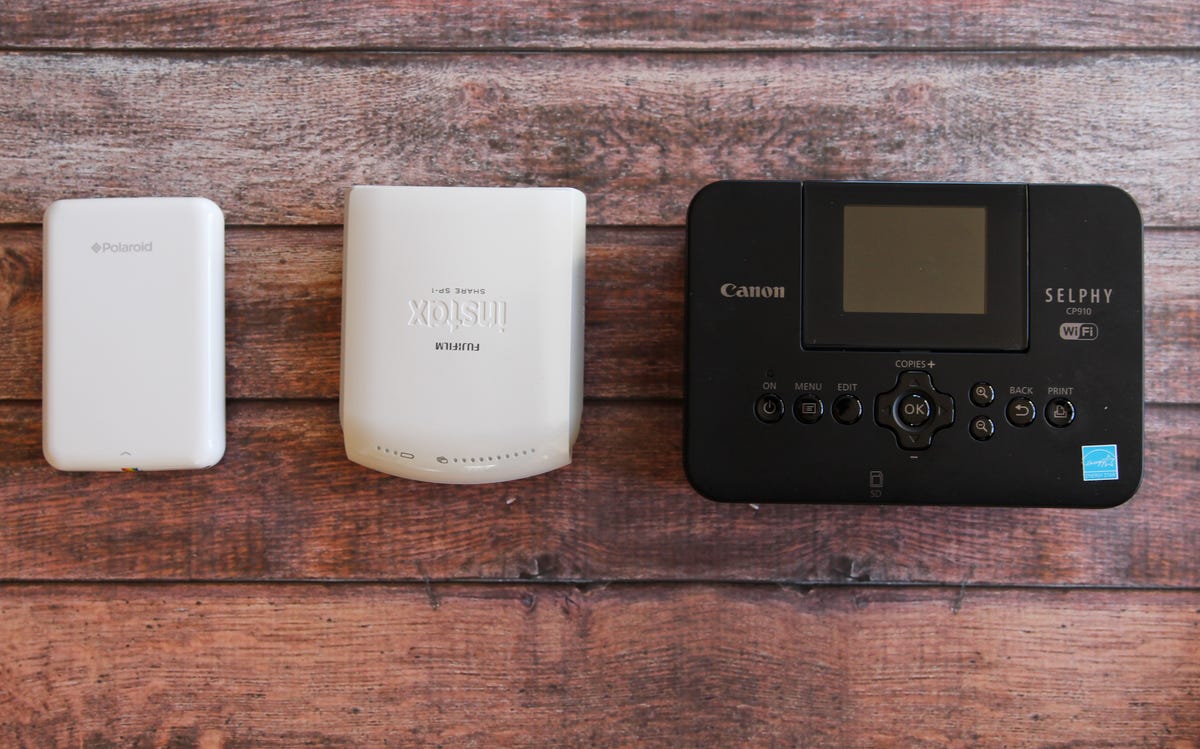

Now playing:
Watch this:
Instant smartphone printers
1:37
So you want to print photos from your smartphone. Right. Now. For that, you’ll need an instant printer.
Since the Polaroid became more of a novelty than a household staple, a number of familiar brands have come in with replacements for the old standard, letting you print any photos on your smartphone with a few taps. The one you choose will entirely depend on how much you’re willing to spend, how fast you want your photos to appear and how important photo quality is to you.

Sharon Profis/CNET
| Polaroid Zip | Canon Selphy | Fujifilm Instax | |
| Dimensions (in) | 2.9 x 0.9 x 4.7 | 5 x 4 x 2.4 | 4 x 1.6 x 4.8 |
| Weight | 6.6 oz | 1.8 lbs | 9 oz |
| Supported OSes | Android, iOS | Android, iOS, Windows | Android, iOS |
| Cost per print | $0.48 | $0.33 | $0.87 |
| Paper capacity 10 sheets | 36 sheets | 10 sheets | |
| Paper size (in) | 2 x 3 | 2.1 x 3.4; 4 x 6 | 2.4 x 1.8 |
| Printing time | 1:19 | 54 seconds | 19 seconds* |
| Price (USD) | $129.99 | $129.99 | $199.99 |
Most portable: Polaroid Zip
If you’re buying an instant printer, you probably want it to be portable, or at least have a small footprint. In this category, you can eliminate the Canon Selphy pretty quickly, as it weighs nearly two pounds and has to stay plugged in.
That leaves the Instax and Zip. Both easily fit in a backpack and won’t weigh you down. But side by side, the Instax dwarfs the Zip, making the Instax look old and outdated, like a CRT monitor waiting to be replaced with a sleek flat-panel screen.


Sharon Profis/CNET
Fastest: Fujifilm Instax
All three printers will produce a photo within minutes, but only the Instax could spit out a print within seconds. The speed we’re talking about here refers to the time it takes for the photo to print from the moment the “print” button was tapped on the phone. (Meaning that it doesn’t include the time it takes to select and edit a photo.)
Surprisingly, the Zip felt excruciatingly long, despite its newness. The Canon Selphy also took more than a minute due to its involved printing process — the printer prints one color at a time for a total of four colors.
So the Instax wins. But there is a catch. Unlike the Selphy and the Zip, the photo isn’t ready for viewing once it’s delivered. You’ll have to wait a few minutes for the image to appear, old-school-style.


Sharon Profis/CNET
Best quality: Canon Selphy
It’s not easy to build a printer that fits in your hand and produces high-quality photos. That’s probably why Canon refused to sacrifice its printing quality for form factor. Although it won’t fit in your purse, the Selphy delivers prints close to what you’d get from your local drug store.
The biggest disappointment in the quality department goes to Instax. The prints that come out of it are washed out, blown out and often blurry. In some cases, the nostalgic look might be what you’re looking for. But for most people, the image quality just isn’t worth the expensive paper (see the next section).
Polaroid’s Zip sits somewhere in the middle, producing bright, inviting prints that when examined closely appear noisy or grainy. It’s exactly what you’d expect from a pocket-size instant printer.


Sharon Profis/CNET
Cheapest overall: Canon Selphy
Before you make a decision based on the price of the printer, factor in the paper. Depending on how often you plan to print, on-demand printing can get expensive fast.
Of the three printers, the Canon Selphy factors out to be the cheapest. At 33 cents per print, it’s cheaper than the Zip’s Zink paper, and more than half the cost of the Instax’s Polaroid-style photos. Compare that to the price of printing at your local drug store or supermarket — about 15 to 17 cents per print — and it’s costly, but if instant gratification is what you’re going for, it might be worthwhile.




